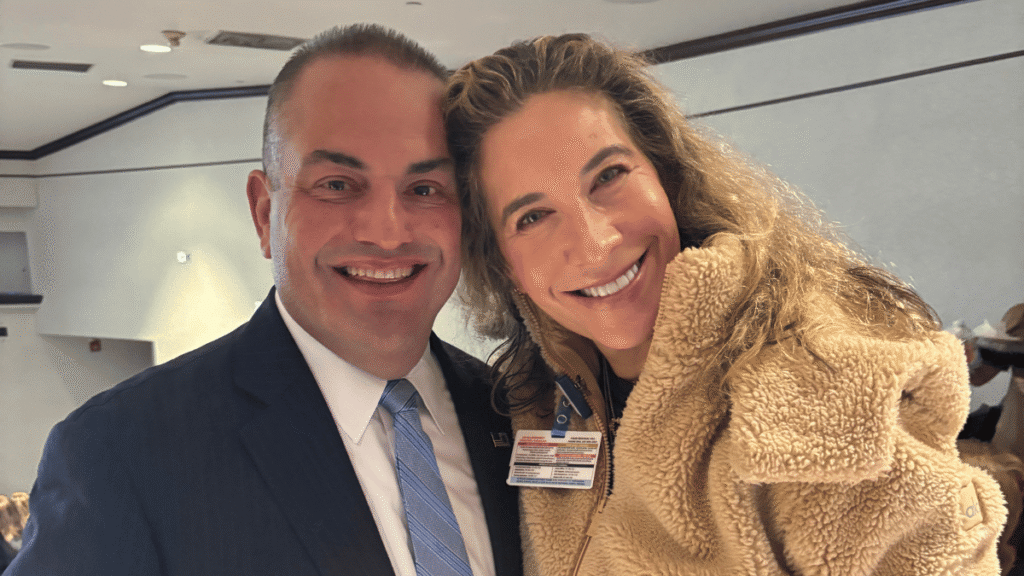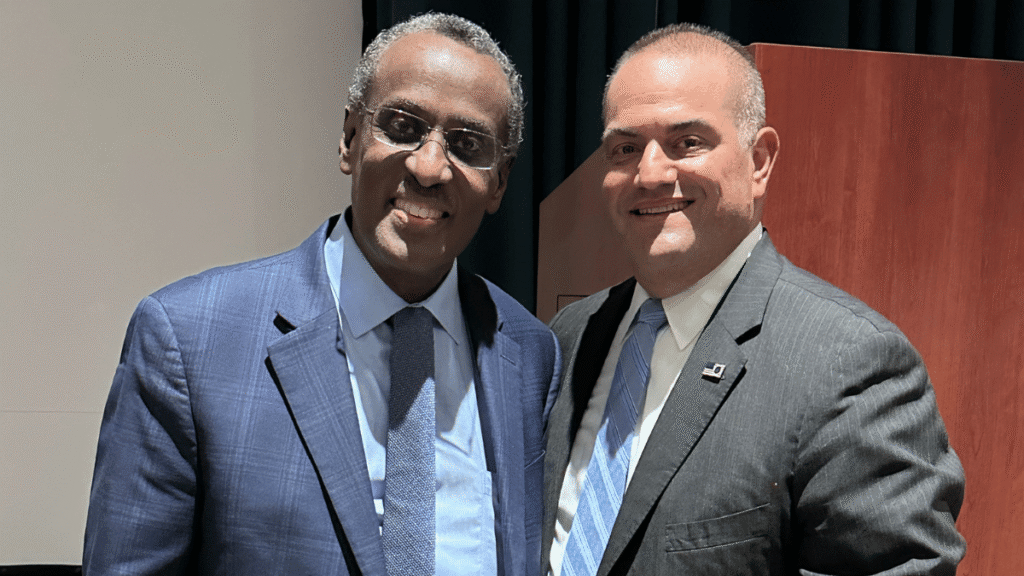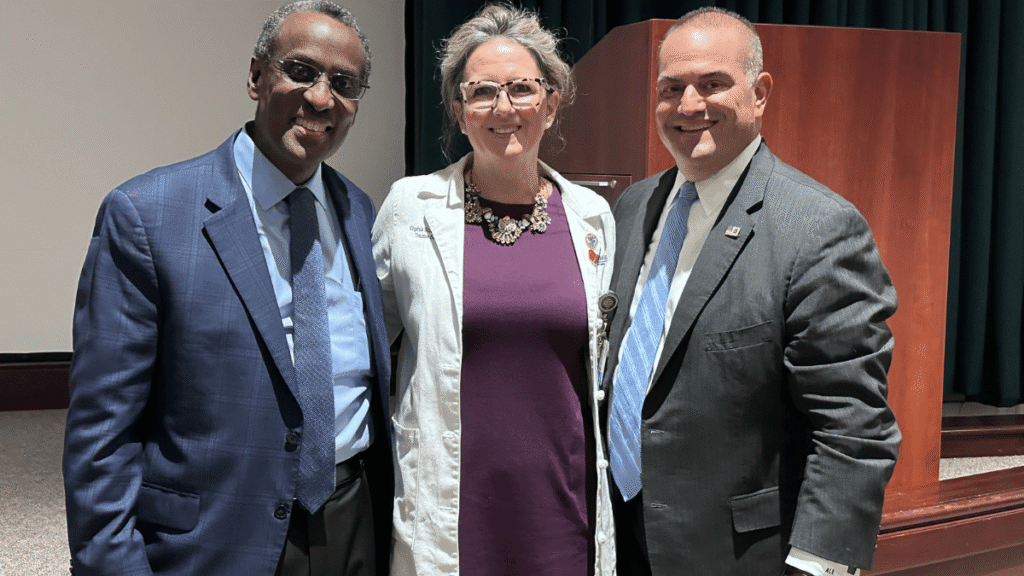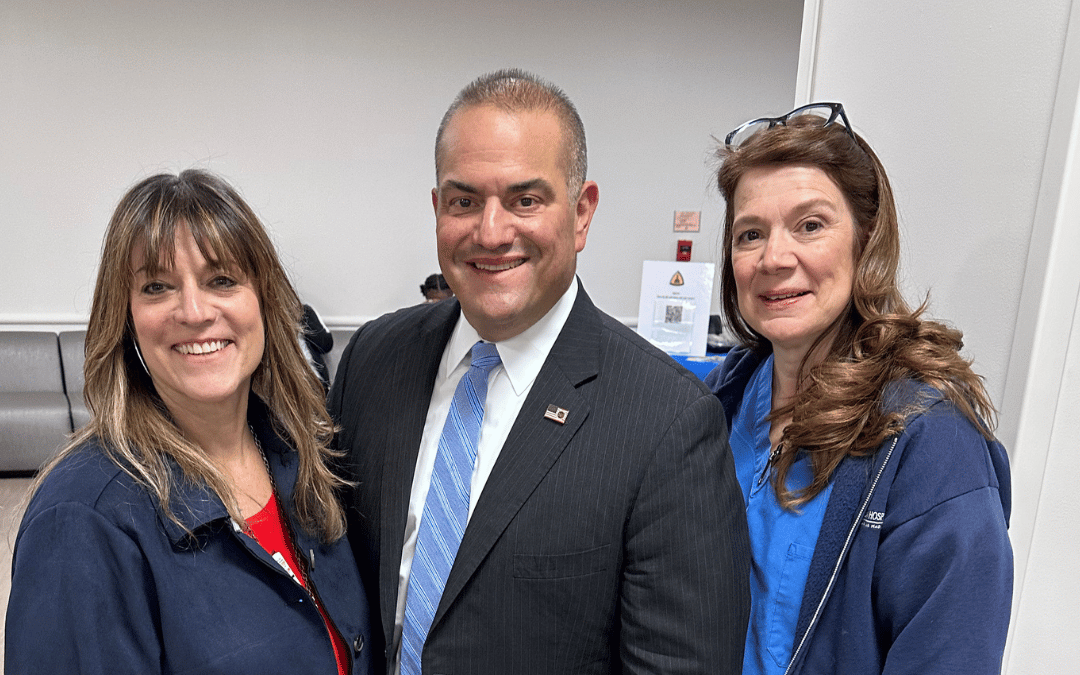Dr. Alexander Eastman was warmly welcomed back to Suburban Hospital, where he began his medical career three decades ago. A nationally recognized trauma surgeon and federal medical leader, Dr. Eastman was asked to serve as the keynote speaker for the annual Critical Issues in Trauma conference at Suburban Hospital, speaking about a major theme in much of his life’s work: leading during times of crisis when everything is on the line.
His keynote, titled “Crisis Leadership—Lessons from Our Nation’s Heroes,” explored what separates teams that withstand chaos from those that are overwhelmed by it. Drawing from more than twenty years in high-threat environments, Dr. Eastman shared lessons learned from trauma bays, tactical operations, disaster deployments, and federal emergency response efforts.
His return to Suburban is also far from symbolic. He said he was working on the trauma resuscitation unit in this hospital while attending college in the mid-1990s, when he would transport patients and observe emergency personnel handle high-pressure, life-or-death decisions up close. He credited that experience with helping him understand how teamwork works in high-pressure situations, which then led him to pursue a career in trauma surgery.

A Career Forged in Complex Environments
Since those early days, Dr. Eastman’s career has taken him from the emergency room to the front lines of tactical law enforcement and into the upper tiers of federal medical leadership.
Today, he serves as Senior Medical Officer for the US Department of Homeland Security, where he helps guide clinical readiness and emergency planning across the Department. He is also a practicing trauma surgeon, and previously served as chief of trauma at the Rees-Jones Trauma Center at Parkland/UT Southwestern in Dallas, one of the nation’s busiest Level I trauma hospitals. Before that, he worked closely with the Dallas Police Department as the medical director for its SWAT team, responding directly to high-risk police operations and helping build programs now studied nationally.
His experiences span civilian mass-casualty events, including the 2016 Dallas police ambush response, military deployments, and large-scale federal initiatives affecting thousands of frontline personnel.

Lessons from the Frontlines
Dr. Eastman said during his keynote that in times of crisis, leadership does not usually come naturally; rather, it results from years of planning and preparing for such an eventuality. He spoke about how hard it can be to remain a leader with decision-making authority at all times while being subject to intense stress and pressure, as well as the necessity for effective, concise communication among members of your team who may be experiencing high levels of stress and anxiety.
Finally, Dr. Eastman stressed the importance of conducting after-action reviews (AARs) as part of your institution’s standard operating procedures, particularly in the days immediately following a traumatic event. AARs should never be performed solely as a “check-the-box” exercise; they should be consistently practiced to identify and improve areas of your organization’s processes that were less than optimal in response to the crisis.
“Preparation is not glamorous,” he told the audience, “but it is the most meaningful work we do.”
A Conference with Purpose
Suburban Hospital’s Critical Issues in Trauma conference focuses on giving trauma professionals meaningful takeaways without pulling them away from their patients for long stretches. The half-day format brings together trauma surgeons, emergency physicians, critical care nurses, EMS crews, residents, and medical students from across the Washington–Baltimore region.
As a member of Johns Hopkins Medicine and the state-designated trauma center for Montgomery County, Suburban Hospital uses the conference to foster collaboration between agencies, hospitals, and frontline providers.
This year, the focus was especially relevant: leadership in complex trauma environments, navigating resource constraints, and strengthening collaboration between medical and law-enforcement partners.
Dr. Eastman’s perspective seamlessly bridged all those themes.

Research and Scholarship
Alongside his operational work, Dr. Eastman continues to publish research on trauma care and crisis leadership.
His recent publications include a 2024 study in the Journal of Trauma and Acute Care Surgery that examines trauma care in challenging border areas and a 2022 article in the ACS Bulletin that discusses leadership strategies for managing mass-casualty incidents. He also serves as a voting member of the Joint Committee on Tactical Combat Casualty Care, a national body that shapes guidelines used by military, federal, and civilian agencies.
His approach blends science, policy, and frontline experience in a way relatively few in the field can replicate.
A Meaningful Return
As the keynote drew to a close, Dr. Eastman paused to acknowledge what the moment meant to him. Standing only steps from the rooms where he once worked as an entry-level trauma technician, he reflected on how that early experience shaped everything that followed, from his time at Parkland to his ongoing federal responsibilities.
“It is incredibly humbling to be back in the hospital where I first learned what this work demands,” he said. “The lessons I learned here have stayed with me through every chapter since.”
He remained afterward to speak with students and residents, answering questions and offering advice for those just beginning their path in trauma care.
For the younger clinicians in the room, the message was clear: careers are often built in quiet steps, long before anyone realizes where they are headed.
And sometimes, if fate allows, the journey leads back to where it began.


